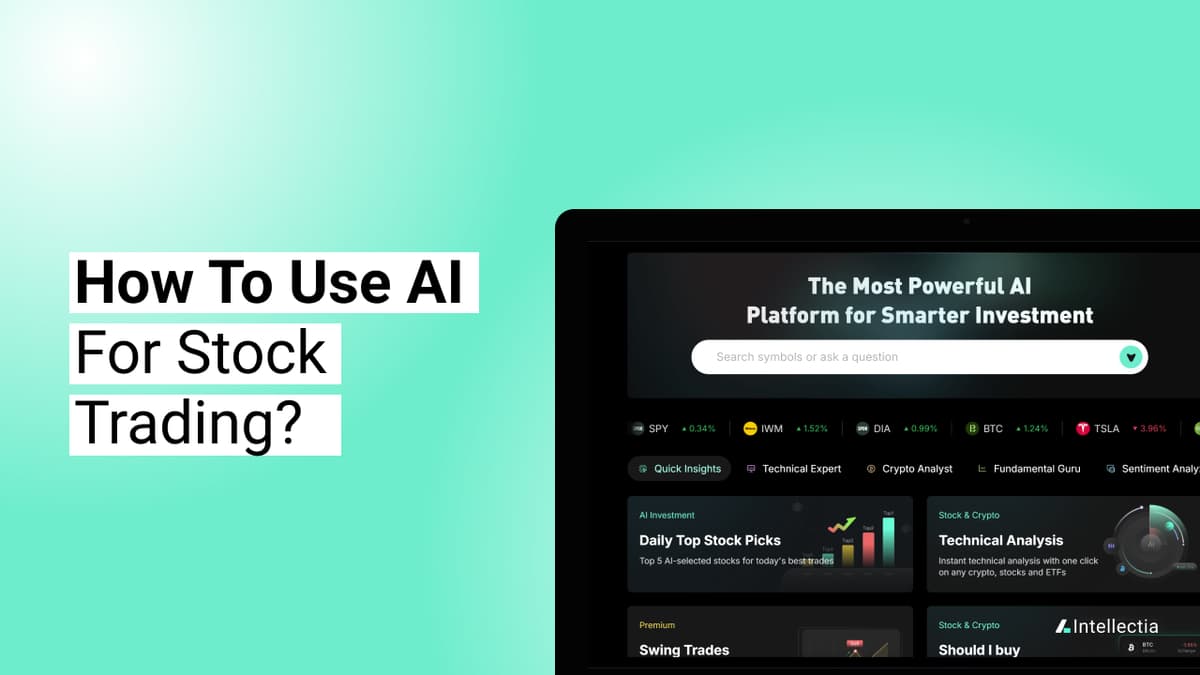Key Takeaways
- AI is becoming a more popularised tool for investing in the stock market
- AI tools can ultimately find patterns faster & more accurately than humans
- AI can filter and summarize a large amount of information & data making it byte-sized and more digestible
- Start slow and test strategies when using AI for trading
AI stock trading is revolutionizing investors' approach to the markets. By leveraging advanced algorithms and data analytics, AI can provide real-time insights, identify patterns, and make predictions that optimize investors' investment decisions.
In this article, we will explore the role of AI technology in stock investing and explain how to use AI for stock trading.

Benefits of using stock trading AI
In stock trading, it is becoming increasingly common to use artificial intelligence technologies such as machine learning, natural language processing (NLP), and big data analysis to analyze financial data.
The power of AI in stock trading lies in its ability to process and interpret large datasets, such as historical stock prices, and news sentiment, to provide actionable insights investors can use to guide their portfolios. Utilizing AI for stock trading is growing in popularity among both retail and institutional investors.
AI can also assist traders in tasks such as predicting stock prices, optimizing investment portfolios, and executing trades leading to faster reaction times.

How AI Trend Analysis Helps Predict Stock Movements
One of the main applications of AI in stock trading is stock trend analysis. AI-driven tools can identify patterns and trends in historical stock data, which can be based on a variety of factors such as price changes, trading volume patterns, and news sentiment.
Any market fluctuation is likely to change the direction of stock prices. AI can be trained to monitor subtle price movements before major changes occur in the market. Based on the latest information, AI will always update its trend analysis results. Once retail investors become adept at using advanced AI tools to monitor market changes, they can capture potentially high-return investment opportunities or avoid losses due to large market movements.
As more and more data is acquired by AI and the algorithms continue to improve, the predictions given by AI will become more and more accurate, which helps investors gain a competitive advantage in the market.

AI Data Visualization for Better Decision-Making
In addition, AI data visualization is also an important application of AI in stock trading. AI can filter and summarize a large amount of information and finally present the information in intuitive graphical formats (such as charts and graphs) to help traders understand complex financial data.
Nowadays, AI technology can create highly detailed interactive visualizations highlighting key market trends, stock performance, and financial metrics. By enhancing the way stock data is visualized, AI allows traders to access important information quickly without being overwhelmed by raw data.
As more and more people understand the progressiveness of AI technology, there have been some AI-powered business intelligence platforms specially designed for retail investors. These platforms can integrate data from various sources, such as stock exchanges, financial reports, global news media, etc. By integrating these data sources, artificial intelligence tools provide traders with insights into market trends, asset valuations, and even potential investment opportunities.

How To Get Started in Using AI for Stock Trading?
Getting started with integrating AI into your investment strategy involves choosing the right tools and platforms. Here are a few steps to help you integrate AI into your trading strategy:
Research AI Trading Platforms
Retail investors who want AI technology to participate deeply in stock trading need to research which AI platforms can best serve their needs.
For investors looking to optimize their portfolios, great AI tools they can explore involve data analysis and conversational AI tools, to assist investors in breaking down complex information and engaging with the AI for further follow-up questions regarding a specific stock.
On the other hand, investors could also utilize AI-driven trading bots to carry out out-trading activities. The trading bots provided by 3comma and Algobot can strictly follow investors' instructions and monitor the market 24/7. However, these trading bots are designed more toward programmable trading, and will only carry out trading tasks guided by the programmer's commands rather than data-driven AI trading.
Test AI Strategies
Before investing a large amount of capital, retail investors can try making small investments to test AI-based trading strategies. This will help investors understand how AI responds to real market conditions and improve their usage methods.
Monitor Performance
Even with AI trading platforms or tools, it is important to regularly monitor investment portfolios and adjust strategies based on market changes. While AI technology can assist investors in optimizing their decisions, human judgment remains crucial in managing risks.

Conclusion
By understanding how to use AI for stock trading, traders can leverage AI analytics, AI trend analysis, and AI-powered business intelligence platforms or tools to optimize their strategies.
However, before deeply utilizing AI technology, investors also need to be aware of the limitations and risks of AI. Only by combining the capabilities of AI with human supervision will enable us to make more informed decisions and minimize the risk of economic losses.




